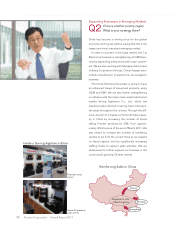Pioneer 2011 Annual Report Download - page 18
Download and view the complete annual report
Please find page 18 of the 2011 Pioneer annual report below. You can navigate through the pages in the report by either clicking on the pages listed below, or by using the keyword search tool below to find specific information within the annual report.
Pioneer Corporation Annual Report 2011
16
Corporate Governance
Under the Company Law of Japan, Pioneer has elected to structure its corporate governance system with a
Board of Corporate Auditors. The Board of Directors, which includes several outside directors, decides on
fundamental issues such as management policies and supervises the execution of business activities, while
the Board of Corporate Auditors, more than half of which consists of outside corporate auditors, audits the
directors’ performance of their duties.
Based on this institutional structure, Pioneer has adopted an executive officer system to expedite the
execution of business activities and clarify the responsibilities for each business. Meanwhile, aiming to
enhance the transparency of decision making, Pioneer has established a Group Executive Committee and
voluntary advisory committees to the Board of Directors.
Board of Directors and Board of Corporate Auditors
Pioneer has adopted a corporate auditor system of
corporate governance. Under this system, the
Company has established the Board of Directors as
a decision-making body for matters of the highest
importance, such as management policies, and as a
supervisory body. The representative directors are
responsible for business execution, while the Board
of Corporate Auditors is responsible for auditing. In
fiscal 2011, the Board of Directors held eight meet-
ings, while the Board of Corporate Auditors held 14
meetings.
Several fully independent outside directors have
been elected to strengthen the supervision of busi-
ness execution of the Board of Directors. In addi-
tion, Pioneer has shortened the term of office of
directors to one year, in order to further clarify their
responsibilities and respond promptly to changes
in the business environment by increasing the
opportunities for shareholders to elect directors.
Furthermore, the Company has adopted an exec-
utive officer system to expedite business execution
and clarify the responsibilities for each business.
Group Executive Committee
The Group Executive Committee, which is formed
to reinforce decision making, comprises directors
and executive officers chosen by the Board of
Directors and holds regular meetings once per
week, in principle. The Group Executive Commit-
tee, under the supervision of the Board of Direc-
tors, thoroughly discusses issues such as priorities
for advancing business activities, investment proj-
ects, Group realignment, and Group-wide man-
agement strategies, as well as medium- and long-
term policies, and approves these issues, or, in
cases where the Board of Directors has decision-
making authority, the Group Executive Committee
reports on these issues to the Board of Directors.
In fiscal 2011, the Group Executive Committee
held 35 meetings and deliberated approximately
160 issues, functioning effectively as part of the
management decision-making process in support
of the Board of Directors.
Voluntary Advisory Committees
Pioneer has voluntarily established the following
three advisory committees to the Board of Direc-
tors, each chaired by an outside director. Their
goals are to improve management transparency
and strengthen corporate governance. These com-
mittees report on the results of their deliberations
to the Board of Directors, and make related recom-
mendations. The Board of Directors discusses their
reports and recommendations, giving due consid-
eration to their content.
Nominating Committee
This committee discusses matters concerning the
election and dismissal of directors; the election,
dismissal, promotion, and demotion of executive
officers; and the election of corporate auditors.
Compensation Committee
This committee discusses issues such as policies
and schemes for remuneration and other benefits
for directors and executive officers as well as indi-
vidual evaluations and compensation levels.
Special Committee
This committee discusses measures to deal with
affairs that have a significant impact on corporate
value, such as mergers and acquisitions, when they
occur, or when they are likely to occur, from the
standpoint of legality, reasonableness, and appro-
priateness.
Ensuring Appropriate Execution of Business
To ensure that directors, officers, and employees
throughout the Group share its corporate philoso-
phy, to “Move the Heart and Touch the Soul,”
Pioneer has determined a “Group Vision” and
formulated the “Rules of the Pioneer Group.”
Aimed at ensuring that the Company will remain
trusted and respected by society as a good
corporate citizen, the “Pioneer Group Charter for
Corporate Operations” is foremost in importance
among the “Rules of the Pioneer Group.” These
























